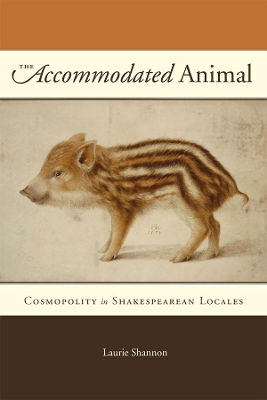Shakespeare wrote of lions, shrews, horned toads, curs, mastiffs, and hell-hounds. But he used the word "animal" only eight times in his work - which was typical for the sixteenth century, when the word was rarely used. As Laurie Shannon reveals in "The Accommodated Animal", the animal-human divide first came strongly into play in the seventeenth century, with Descartes' famous formulation that reason sets humans above other species: "I think, therefore I am." Before that moment, animals could claim a firmer place alongside humans in a larger vision of belonging, or what Shannon terms cosmopolity. With Shakespeare as her touch-stone, Shannon explores the creaturely dispensation that existed until Descartes. She finds that early modern writers used classical natural history and readings of "Genesis" to credit animals with various kinds of stakeholdership, prerogative, and entitlement, employing the language of politics in a constitutional vision of cosmic membership.
Using this political idiom to frame cross-species relations, Shannon argues, carried with it the notion that animals possess their own investments in the world, a point distinct from the question of whether animals have reason. It also enabled a sharp critique of the tyranny of humankind. By answering "the question of the animal" historically, "The Accommodated Animal" makes a brilliant contribution to cross-disciplinary debates engaging political theory, intellectual history, and literary studies.
- ISBN10 0226924173
- ISBN13 9780226924175
- Publish Date 2 January 2013 (first published 1 January 2013)
- Publish Status Active
- Publish Country US
- Imprint University of Chicago Press
- Format Paperback
- Pages 312
- Language English
- URL http://wiley.com/remtitle.cgi?isbn=9780226924175
